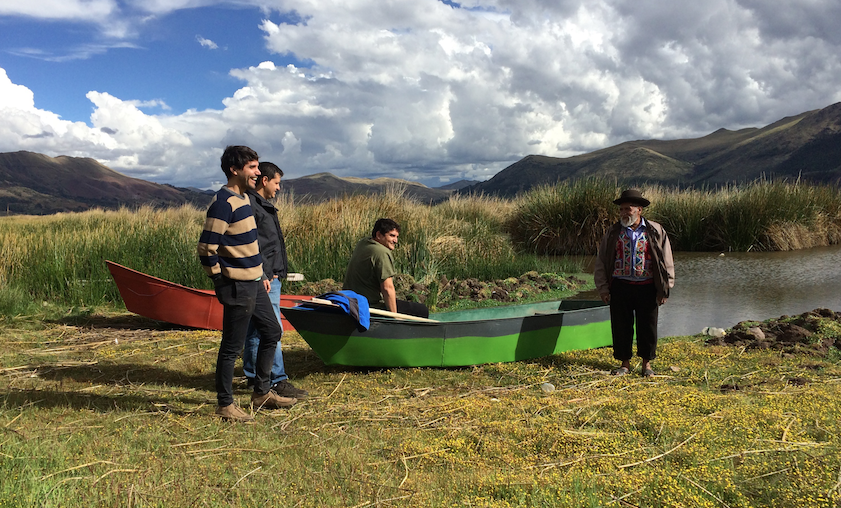
SECOND TRIP ORÍGENES: THE AWAKENING AND CONTINUITY
Virgilio Martínez brought us to Cusco for the second journey of Orígenes, developed in colaboration with Mauro Colagreco and Jorge Vallejo.

Virgilio Martínez brought us to Cusco for the second journey of Orígenes, developed in colaboration with Mauro Colagreco and Jorge Vallejo.
By Paola Miglio / English version Taste of Perú
Two hours from the city of Cusco, in Sangarará, there is Chahuay, a little community dedicated to agriculture and ranching, located at 4000 masl. Virgilio Martínez brought us there for the second journey of the Orígenes project, developed in colaboration with Mauro Colagreco from Argentina and Jorge Vallejo from México. We found peace, honesty, simplicity and the essential, we were able to reprioritize.
Francisco Quico Mamani and Trinidad Mamani Cascamayta do not want to move from where they live. They have managed to turn their own little farm by the lake shores into the place where we all would like to go back to. The afternoon is coming and in the middle of one of their fields, they prepare the clay soil to make the huatia (typical dish of the Andean gastronomy made under the soil). They selected the best corn, soft and juicy. They also selected recently harvested potatoes, sweet potatoes and broad beans. Everything will be slow cooked under the earth using thick wood pieces. They prepare huatia for the afternoon snack, for parties, when they have guests and to celebrate. They serve it with uchucuta (ground ají pepper) made in a batán (large flat stone). So, this is how our second Orígenes journey started: spending two days with the Chahuay community in Sangarará (Acomayo province), on the way to Puno, only one hour and half from the city of Cusco.
Trinidad and Francisco, married for a long time, told us that Chahuay was a sad place because people were extremely poor and unprepared. They share their story while fueling the fire for the huatia. That young people used to go to Puerto Maldonado (city in the jungle) to find a job and they came back sick, just to die here. That men and women drunk so much that everything was dry. We hear the insolent wind breaking in between the pine trees planted by Francisco to protect his sown fields. It does not bother us. It provides us with a bit of freshness in this sunny afternoon. It especially helps as a background to lull us while we hear their story, and even though it is painful, long, and full of effort, at the end it is a story full of happiness. We noticed this happiness when Trinidad told us about the herbs and vegetables that she was able to grow in her small patch. Her eyes shine in her nice and friendly tanned face. Her soft and girlish voice is full of emotion when she talks about what is around: “my lagoon, my land, my house.” The same happens when she remembers that one of her daughters who moved to Lima is thinking about coming back. She says “now I have everything.” “Why should I go somewhere else?” Francisco supports her, looks at his immense lagoon: he loves his wheat and he values his potatoes. They are rich and they are aware of it.
First trip to Yucatán, México: Clean start
Sometimes to understand a person’s heart you just need a moment. Sometimes you need a couple of hours or a couple of days. Sometimes a mean heart does not reveal itself even after an entire life, or it hides itself behind smiles and a long sleep on its back, between false affections and occasional flatteries. We are tired of this. And we are getting away from it this time to fall down in a suffering place – and it suffers so much-, but this space also knew how to overcome difficulties with education, work and especially love for the land. Where what we see is what it is. Where we come back to the origins is the answer and the salvation.
TRINIDAD
Trinidad has her kitchen sheltered by the shadows of the trees. Virgilio and his team have been spending time with her and her family for almost three years. They visit them often to observe, to see her cooking, to hike the mountain and harvest together herbs, cushuro (Nostoc Commune) and roots. The affection they have for each other is visible when they meet up, and they hug each other tightly. Both know that this is not an occasional meeting but an enduring friendship. You notice mutual respect. Trinidad has small eyes, a warm look, warm and wise hands. With these hands, she prepares the uchucuta, the main sauce prepared to accompany the huatia. She prepares it in this beautiful batán (stone) that time and the stones´ friction have shaped. A bit before she offered us tea with herbs, picked from her patch, where rose, lettuces and beetroots are also growing…On the table, there is crunchy corn and cheese, and a selection of the different kinds of corn that we can find in that area. Trini, as they call her, finds a spot under the shade of a tumbo tree and starts grinding sachatomate, rocoto, toasted corn, ají pepper and huacatay. Before she used a herb called chijchipa, thinner than the first. “For the huancaina – she admits – we use tarwi (Lupinus mutabilis)”.
– You have everything here, Trinidad. What do you need from the store?
– Oil and sugar. Nothing more. I have my plots. Now my cows are pregnant, I have two. And a little bull. Before my life was sad, the community work was rotary. But now everything has changed and when there are plants you have life and happiness.
The change Trinidad is talking about started with Sierra Productiva, a project where federations and associations are the main actors, and they receive trainings from the Instituto para una Alternativa Agraria (IAA), an NGO working to foster green vegetables, guinea pigs, dairy products and handicrafts, depending on the areas and their resources. They arrived at Chahuay at the end of the 80s and they started re-launching the community. Trinidad tells us that when they go to work the field they bring coca and chicha, and that before they drink it they always offer it to the earth. It is important doing what your parents did, tradition is essential. Trini knows about her richness. She said that they have woken up from a large drowsiness. They even have a greenhouse, spring wáter, and organic compost. “We are ok. There is a big lagoon, there is fish to buy. When there are no more fish, we have chickens, Guinea pigs, dairy cows. We use natural insecticide that we prepare with the same herbs. Our potatoes do not lose their taste, their color; we always maintain our seeds as they were before”.
FRANCISCO
Francisco’s love and relationship with agriculture and ranching can be traced back to his childhood. His parents taught him to respect the Pachamama since she is the one who protects; the one who watches over and everything blooms behind her. “We have to take care of her. In the apu (mountain in Quechua) Vilcacayu there are vicunas that we have in this sector” he said. “In the other sector – he points to it – where you can see the sunrise, the puma, the deer and the vizcacha live”. Francisco is leaning over one of the adobe’s wall that separates his farm from the lagoon’s shore. He invites us to walk to the edge while the potatoes cook in the huatia. We have time.
We walk carefully, the road is irregular. “Frogs are coming back”, comments. It seems like they disappeared for a long time since there was nothing to eat. And as we get close, everything gets humid, the breeze hits our face, we feel life. Pedro, who fishes in the area, comes with us. He goes out in the morning to fish big silversides and carachi (Orestias luteos) that he will then sell in the village. Or maybe he will barter for freshly farmed vegetables. Before there were more, obviously. But what they have now is enough for the daily meals and the good celebration banquets.
The increasing heat and the gale-force winds changed the routine. We think they have gone through a sort of reformulation of their relation with nature. A recognition. A different learning experience from the one that changed his life in 1989, when Sierra Productiva arrived. When they started planting trees and installing irrigation. “My little house was the pilot. During those years there was a lot of famine and once we started farming these vegetables, we changed. Every year I have to plant between 400 and 500 trees. This is valuable. This means life, if there aren’t trees, I do not think that life can exist”, says Francisco.
DORINA
Dora Arapa Quispe, or Dorina, as Trinidad calls her, is a neighbor’s daughter. She dressed up for a party, with intense pink colors that match her cheeks and her 20 years. Dorina studies gastronomy in Sicuani and she has came to help Trini in the kitchen. She selects the ingredients; goes quickly from one place to another, makes torrejas (flattened hamburguers), tamales, head broth. Helps putting the Guinea pig in the oven. For the lunch before the famous huatia, everything is well-organized. The corn is one of the main ingredients, the sustenance. The potato, the partner. The protein celebrates.
Dorina goes to school everyday. She leaves at 6:40 am and arrives at school almost one hour later. Finishes at 1:00 pm and stays until 2:00 pm to do her homework because in Chahuay there is no internet. At school, Dorina learns national and international recipes, baking, cocktails…there are 22 students and the majority of them live in Sicuani. Dorina says that she likes cooking and would like to incorporate organic products from her area in traditional dishes. Those dishes she learnt from her mother when was a child: olluco, tarwi stew, pepián de cuy or enrollado, soup, causa or picante de quinua. Dorina noticed that things have changed. She understands how her mother succeeded raising her as the majority of the mothers of the area did: The Guinea pig pays for education. She values the seeds that arrived with the NGO because they improve her economy (broccoli, lettuces, cabbage, chard). She jealously saves them; admires her father’s fishcatch; and painstakingly takes care of the Andean herbs which grow on the mountain and start blooming in the rainy season. There is sage, muña, and tuluca. She goes up the mountain, digs the roots up and plants them in her patch.
We listen to her, amazed. She is only 20 years old yet she clearly understans her situation. There is no doubt. She wants to stay in Chuhuay, start a little restaurant with the products offered by the earth, create dishes and integrate her supplies. She wants to grow.
Jorge Vallejo asks her:
– Do you notice the difference between cooking the ingredients you have at school and the ones from your home?
– Yes, as for vegetables, the tomato from the market is a bit watery, but the one I have in my greenhouse is sandy and the sauce comes up thicker. The taste is not the same. The aroma is stronger.
She said it all.
THE CONTINUITY
The huatia is ready. Trini and Francisco dig up the earth and place the supplies on a colorful tablecloth. They offer us a light corn chicha while we wait for the potatoes and broad beans to cool…The aroma is blessed: land, wood and field. The taste is even better. It is like trying the first sweet potato of your life, like biting the first soft corn on the cob. Questions come and go, motionlessness, the breeze, they leak. There is no better time to spend a moment together. To understand that nothing matters. Reconnecting with what is around you is an important step to learning to value what you have, and to discover again what you sometimes forget. They were always there. They are the wise. They are the ones who learned how to deal with the changes of weather and time. We were the ones who went away. We are the lost children who need to come back and that finally understand that we do not know anything and that we need to accept that sharing means learning. “If something happens in the city you will not survive a week”, says Francisco, and then starts laughing out loud at our astonished silence and confusion. You are right. If something happens in the city, our lists and stars will be simply worthless.
All Latin America provides this education and has this potential. It can go even further. Technically, how many powders could be made, how many textures can be included in a dish? It is not enough to say that you work with a good product. If you do not travel, if you do not observe, if you do not ask and absorb the information and pass it on… you do not have any idea of what happens. And this recognition, this taking time to talk, to learn again, is healthy. How can we move forward then? Orígenes is a project constantly on the move, in development. To give it continuity and to make it more than a simple anecdote of a few trips, the idea is to create an interactive tool to connect Latin American chefs and the farmers who work with them. Everybody will be able to share the information, ideas, tours and plans from this project. “We believe that this technique is quite broad and reliable because nobody wants to include inaccurate data. It doesn’t matter where the cook comes from or where he/she works, the most important thing is that he/she shows the ingredient and the way he cooked it. He/she can be a farmer or a chef. We are collecting information, we are going to open our records to everyone”, says Virgilio Martínez.
We said it before; sharing is the foundation of continuity, of the lifelong we foresee for Orígenes. This way the project of three people reaches the entire region, and the work of one is not forgotten. “We want to keep promoting the journeys, we want Orígenes to transform itself from one group to everyone. We want it to change, to move forward, because otherwise it runs the risk failing. Everybody can take this project and turn it in a powerful weapon”. The journey does not end today. Tomorrow we will wake up at 4:00 am, go out to dig up roots and talk more with Francisco, Trinidad and Dorina. We will have breakfast together, go to the local market, eat artisanal bread with Anta cream and fresh trout at El Hada. We will fly back to Lima, México, and Buenos Aires to keep working. Orígenes grows. It spreads. It is time.
VISIT CHAHUAY
The best part is that you can always come back. Francisco and Trinidad have a fully-equipped cabin to rent in front of the lake and another in the mountains. You can live an unforgettable experience, learn from them. Share experiences. To stay there (as you know it is located just one hour from Cusco) you can contact them through Sonia Taco from Sierra Productiva: sonia.taco@sierraproductiva.org / 984 655 891. To learn more on Chahuay you can read the text Cuatro Lagunas by Mater Iniciativa.
DATA
The translation: www.taste-of-peru.com / US Telef: 703-822-5311 / Peru Telef: 222-708
Un nuevo whiskey se une a la familia: la mezcla de Perú y Estados Unidos en una botella.
Leer másEl festival culinario proyecta congregar a 10 mil asistentes en esta edición. Son más de 20 las marcas invitadas.
Leer másRomper con el círculo de la pobreza en el campo es lo que logra que el café sea sostenible. Una entrevista a José Rivera, creador de Origin Coffee Lab.
Leer más



